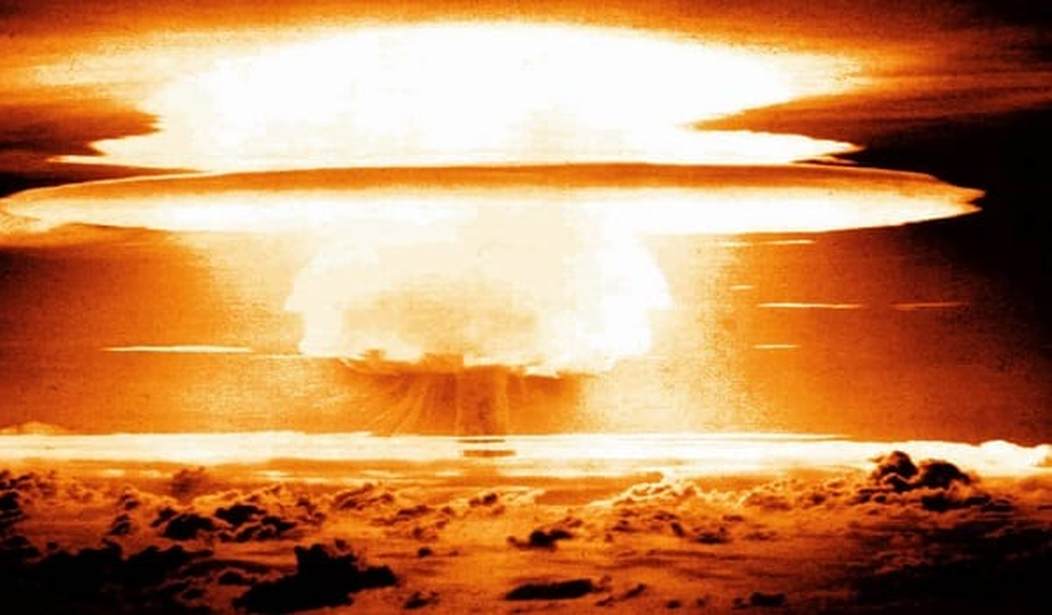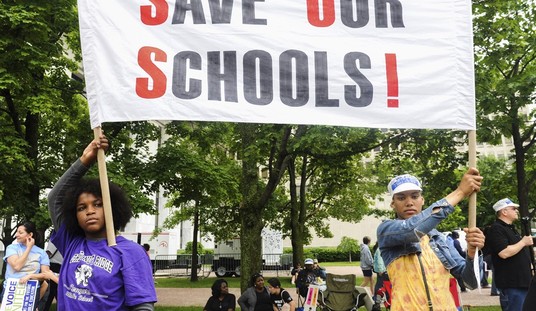If you are, like me, a Boomer, you probably remember the civil-defense drills we all went through in the Cold War years. "Duck and cover," and so forth; we were taught that if we saw a bright flash, we were to drop to the ground, tuck our knees up tight, cover our ears and eyes, and kiss our tukhuses goodbye. There is, after all, a good argument to be made that in the event of a global nuclear war, the best place to be is at ground zero in the first strike, to get it over with quickly.
Now, since the Cold War ended, the world's nuclear arsenals have declined somewhat. But there are still plenty of multi-kiloton crowd-pleasers in armories around the world, and some of those arsenals are controlled by some unsavory governments, like North Korea, Pakistan, even Russia, and China. And Iran, we might remember, was working on the development of a nuke of their own, until those efforts were forcibly disassembled by Israel and the United States in another example of the old military assertion that "There is no problem that cannot be solved with a suitable application of high explosives."
All this raises the question: What is the real threat? The nukes, or the people who control them?
The atomic era is now 80 years old but there is still an unresolved fundamental debate about its greatest danger: is it man or machine? Is the main problem the nuclear weapons themselves or those who control them? The answer will drive America’s approach to both deterrence and risk reduction.
Both sides of the debate acknowledge that man and man’s creations are both potential dangers – but the tension lies in which is greater.
Some who believe nuclear weapons are the primary danger point to growing political tensions as states grow their arsenals, plus the history of false alarms, accidents, and other operational failures. Fewer nuclear weapons, in their view, should lead to fewer nuclear dangers.
Others believe that nuclear weapons are tools used by political leaders – whether for good or for ill depends on who wields them. The United Kingdom, for instance, owns more nuclear weapons than North Korea, yet most of the world is concerned about aggression from Pyongyang, not London. For proponents of this view, an inadequate U.S. nuclear arsenal would in fact heighten nuclear dangers. Revisionist autocracies like China and Russia may see their nuclear advantages as useful coercive tools for expansion.
Here's the thing: Nuclear weapons are just weapons, despite their horrifying power, despite their deserved status as weapons of mass destruction (WMD), despite the civilization-ending possibility of a global thermonuclear exchange. They are tools, one tool in any country's military toolbox. They are (and should be) a tool of last resort; one doesn't reach for a sledgehammer to drive a tack.
Tsar Vladimir I, though? What might happen should he perceive a likely defeat in Ukraine?
Vladimir Putin is a creature of the Cold War, and while an apparatchik he has been and apparatchik he may be, but the use of nuclear weapons throughout the Cold War was a big, shiny red line that nobody wanted to cross. I’m skeptical in the extreme that Putin has any notion that once that bottle is uncorked, there will be anything much left in the way of control – and the nuclear-armed world, I remind you readers, includes such wildly unstable regimes as North Korea.
Skeptical as I am, though, I’m reluctant to say that this is an impossible scenario. If Russian forces are being pushed back, and Putin sees the necessity of a win for his political (or maybe even physical) survival, well, desperate men are known to take desperate actions. And Putin isn’t the most stable guy on the table. If anything stops him, it won't be the United States having nuclear weapons per se - it will be the fact that Donald Trump has those launch codes. Joe Biden, let's face it, was incapable of making any substantive decision and acting on it. President Trump is quite the opposite.
It's not the nukes that are the issue. It's the people who wield them.
If nuclear dangers and nuclear numbers are not strongly linked, then the United States can safely ignore those who say it is dangerous to build more nuclear weapons beyond the replacement-level already planned. Critics will cry that the United States will be starting an “arms race,” ignoring of course that China and Russia began racing years ago. But even granting their claim, the one thing worse than an arms race is allowing revisionist dictatorships to believe they can exploit their nuclear advantages at the expense of the United States and its allies.
It isn't the United States that is starting the arms race; we are reacting to it.
Nukes are not going to go away, no matter how many signs are waved by peace advocates. The nuclear genie was let out of the bottle in 1945, and there's no going back. They are in the toolbox, and I suspect that, sooner or later, maybe in 10 years, maybe in a century, some nuclear-armed rogue state is going to pop one, somewhere. Maybe Tel Aviv, maybe New York, maybe Seoul or Tokyo. But sooner or later, it will happen.
If there is to be any meaningful response by the United States, even if only to cauterize a wound, we had better be ready. To respond, not to initiate.
Read More: Vance: Iran 'Incapable of Building Nuclear Weapon' After US Strikes
New Satellite Images Show Iranians Feverishly Trying to Clean Up the Mess at Fordow Nuclear Site
It is precisely because nuclear weapons are not a problem but merely a tool that the United States does not present a nuclear threat to the world. Our policy on weapons of mass destruction has always been that we will only respond, never initiate, to a WMD attack. And that response-in-kind will be nuclear, because we no longer have a chemical or biological arsenal - at least, not one that is public knowledge. But the problem isn't with the United States, whether we merely refurbish our nuclear arsenal or start building new weapons. The existence of the nukes themselves isn't the problem; they are the sword, not the hand. It's the hand we need to worry about.
Only people have volition. Only people can act; only people can push those launch buttons. That's not the ideal way for things to be in the world, but that's how they are, and if Russia, China, and North Korea have nukes, we'd better have them too, and we'd be better off making sure they will work, in the event the unspeakable happens.














